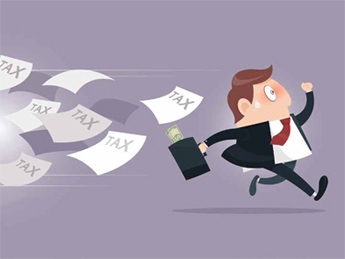Recent tax fraud exposures make us wonder as to why there is so much tax evasion. What is the psychology of a tax evader? What leads us to evade tax?

There was a news item recently that a sports club in Bengaluru had to report a surprising discovery to the tax department and the police. The club had to force open three lockers allotted to a member for non-payment of monthly rent. The lockers meant for keeping sportswear and related items contained a big treasure. Property papers for about Rs.800 crore, foreign currency worth Rs.3.9 crore, cash in Indian currency to the tune of Rs.1.8 crore, diamonds worth eight crores and gold biscuits worth Rs.20 lakhs were found in these lockers. The concerned person could not explain the discovery. On the contrary, he was found bargaining with the management of the club to hand over the property documents in lieu of cash recovered from the lockers.
There was another incident recently in Chennai when an Income Tax raid against a government road contactor exposed a cash seizure of Rs.178 crore and 100 kgs of gold. This cash seizure was the biggest in the history of tax raids from a single assesse. The cash seizure was recovered from many cars and from the premises of loyal employees of the searched person. These two incidents relate to cases of tax-evading on a large magnitude and such incidents are rapidly increasing.
The question arises, why is there so much tax evasion? What is the psychology of a tax evader? A preliminary effort to peep into the mind of a tax evader reveals that there are many factors involved.
The first that comes to notice is the level of wealth. Too much wealth enhances the probability of tax evasion. They have more and more flexible sources of income, allowing for manipulation and avoiding the notice of the tax department. Think of an Ultra High Net Worth Individual (UHNWI), who can off-shore his financial assets and the accruing gains, as against a teacher or a small business man. The super rich indulge in hawala transactions for transferring their tax evaded money to tax havens and bring it back as per their convenience through round-tripping. They can choose the illegal action of over-invoicing and under-invoicing as per the need of movement of black money. There is a cost involved in these illegal activities which only a rich person can pay. Big wealth creates a craving for more wealth and this leads to the process of playing a money game with a target score. The targeted score gets higher if the earlier targeted score is achieved. Playing this game of money, one sometimes deviates from the clean path and treads the dirty path of tax evasion.
Faith in the laws and government institutions deter a person from indulging in tax evasion. A patriot may think twice before becoming a tax evader. Tax evasion to a patriot will mean stealing the income of the country. Strict penal laws and honest income tax searches serve as deterrent for tax evasion

Nobody likes paying tax. Nobody likes a higher tax rate, as it adds to the tax burden. A direct nexus has been found between higher rate of tax and tax evasion. Firstly, a tax payer goes for tax planning through a legal way of tax avoidance to reduce the tax burden, but for some this is not enough. This second kind of potential tax payers choose a way to evade tax where both the earned income and financial assets are taken out of the very system of taxation.
The genesis of black money in India was in the high tax rate prevalent earlier. Prior to the 90s, our highest tax rate slab was 97 per cent with the added burden of wealth tax, gift tax and estate duty. A person earning income in the highest slab bracket was virtually paying more to the government than what he was actually earning. This became the trigger to earn black money and save tax by evasion. Today, tax rates in our country are moderate, but the cultivated habit of tax evasion and earning black money continues.
The third attribute which comes to notice is the probability of getting caught in the audit or tax scrutiny. A tax evader or a potential tax evader weighs the pros and cons of his proposed action of tax evasion and the chances of getting caught before he actually indulges in it. He goes for tax evasion if he feels that the chances of getting caught is not much. He goes by his self-reasoning and by the advice of his consultants. The chance that a fearful person will become a tax evader is less. Repeat offenders become bold and mature into big tax evaders. The fear of system is the deciding factor, but as fear is a personal trait, a person decides whether to become a tax evader or be an honest tax payer, depending on the extent of his fear of the system.
Fourth, personal morality as well as the prevailing perception about tax evasion in the society plays a major role. A person who is honest will remain honest despite the increasing tax burden which he may have to bear. A person who is corrupt will remain so, despite all advice to pay proper tax. But the majority of the people are fence sitters and for them morality matters a lot. In our country, tax evasion is not seen as a big crime. On the contrary, it is seen as a part and parcel of doing business. Rich and wealthy people get respect in the society and tax frauds done by them are not condemned. People also see that rich people do not go to jail despite getting caught in tax frauds and they get protected by the power of money and costly advocates. In such a scenario, fence sitters too choose to become tax evaders as they save money and also get respect in the society. There is no loss to face for a tax evader and hence more people jump on to the band wagon of tax evasion.
‘Prior to the 90s, our highest tax rate slab was 97 per cent with the added burden of wealth tax, gift tax and estate duty. A person earning income in the highest slab bracket was virtually paying more to the government than what he was actually earning. This became the trigger to earn black money and save tax by evasion’
Fifth, it is the government system, tax laws and conditions in the tax department which play a major role in the psychology of a tax evader. Faith in the laws and government institutions deter a person from indulging in tax evasion. A patriot may think twice before becoming a tax evader. Tax evasion to a patriot will mean stealing the income of the country. Tax laws and the functioning of the tax department are other things which a potential tax evader keeps in mind. Strict penal laws and honest income tax searches serve as deterrent for tax evasion; tax evaders feel easy if tax department officers are not honest and they can compromise with them for their benefit. Strict and honest officers and a firm tax department which pursues a tax fraud case to the logical end serve, as a brake to tax evasion. Laws against benami property, black money kept abroad and money laundering, recently passed by the government may also serve as a dampener to tax evaders as this may affect their psyche. Recently, it has been seen that money kept by Indians in Swiss Banks have considerably gone down due to strict enforcement of black money laws against unaccounted money kept abroad. A potential tax evader monitors the laws related to tax fraud before indulging in it.
The psychology of a tax evader is a complex web to fathom and it may differ from person to person. To him the ultimate objective is self-interest, of saving money by all means. For a tax evader the end of saving money by not paying tax justifies his illegal means. This is the reason why we have big tax evaders and scamsters like Vijay Mallya and Nirav Modi.
Both the government and we as members of the society have to jointly tackle this. The government has to ensure that the tax department, particularly the enforcement wing, has honest and passionate officers who can take the case of tax scrutiny to the logical end without compromising. The word must go round that once a case is started by the tax department there will be no escape and there will be necessary prosecution of the tax offenders. The government should create an efficient task force consisting of senior people, to monitor our tax laws and also related laws so as to detect the loopholes and the same should be plugged immediately by amendments to the concerned laws. This is important as tax consultants keep locating these loopholes for the benefit of their clients. The government should ensure that tax fraud cases end in prosecution and that there should be a reasonable time limit for that. In cases of scams, there should be fast-track courts so as to send scamsters to jail without much delay. Big people going to jail for tax fraud will deter potential tax evaders. In addition, our laws should be simple so that there is not much scope for litigation and escaping tax liability.
As for us, we should ensure that tax fraudsters should be named and shamed. They should not get respect. The collective work by the government and we as citizens will definitely have some effect against tax evasion.
by S K Jha